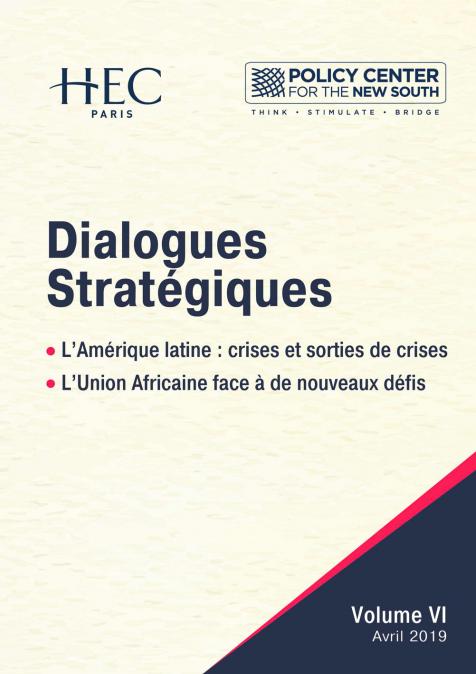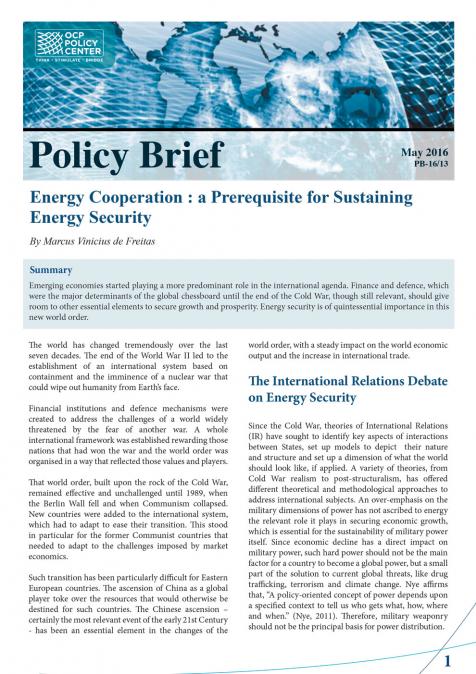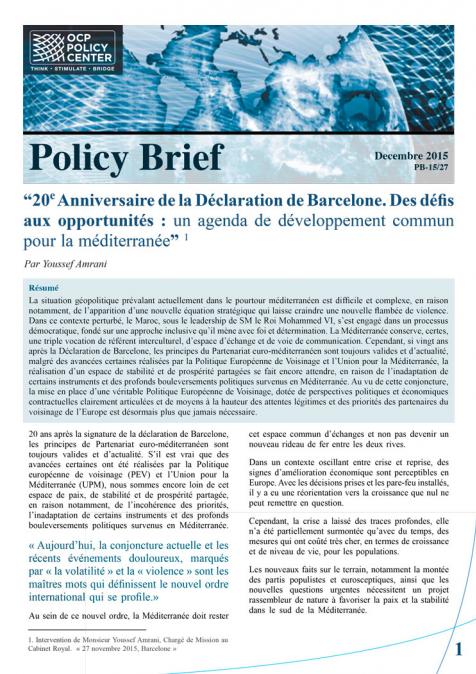Publications /
Opinion
The author is an alumnus of the 2015 Atlantic Dialogues Emerging Leaders program
Five brief bullet points: this was the entire contents of President Jair Bolsonaro’s political plan presented during the 2018 Brazilian Presidential race detailing his foreign policy ambitions. Besides the pro-Trump rhetoric, little was known regarding Mr. Bolsonaro’s international relations plan. Elected with 55.13% of the valid votes in a second-round turn, the victory of the Social Liberal Party (PSL) candidate shifted Brazil to the far-right, breaking the Workers' Party electoral winning streak and brought about a new era in Brazilian foreign affairs.
Months after his victory, the choices announced for his presidential cabinet were crucial to understand any future achievements during Bolsonaro's term. His cabinet appointments basically comprised three distinct political groups: the military, the neoliberal economists and the anti-globalists. The appointed Foreign Affairs Minister, Ernesto Araujo, belongs to the anti-globalist group and has been highly influenced by another conservative thinker, Olavo de Carvalho.
Such anti-globalist conservatives have been denouncing the United Nations, the Paris Agreement and other so-called globalist forces in order to cultivate right-wing nationalism, in addition to fostering alignment with the so-called North countries like the United States and Israel. This ideology permeated the first Presidential diplomatic missions to the U.S., Chile and Israel and has influenced critical regional policies – such as the case of Venezuela, and the Mercosur -, which are being approached along this analysis.
The United States and Israel
The visit by President Bolsonaro to Washington D.C. has obtained a few tangible results such as the agreement on technological safeguards allowing the commercial use of satellite launching base in Alcantara, Maranhao. The agreement was reached after almost 20 years of negotiation and represents excellent value to the U.S. due to its proximity to the Equator, which will yield approximately 30% savings in fuel costs. The closer proximity to Western Africa might also be ideal for America's political and military long-term strategies.
As an attempt to gain further support for Brazil's bid for membership to the Organization for Economic Cooperation and Development (OECD) and to demonstrate its willingness to establish closer relations with Trump's administration, President Bolsonaro decided on a unilateral visa waiver policy for U.S. citizens. On the one hand, the plan to join the OECD implies a decisive concession, whereby Brazil would forego its World Trade Organization (WTO) special and differential treatment (SDT) on future agreements, a benefit granted to developing countries. On the other hand, once part of OECD, Brazil would be obliged to alter several public practices in regulatory policies, transparency and others that might assist in creating a more propitious environment for development of the domestic market, and consequently, attract foreign investment.
On his second bilateral international meeting, Mr. Bolsonaro fulfilled a campaign promise by visiting Israel and its Prime Minister, Benjamin Netanyahu, who also ensured total support for Brazil's efforts to join the OECD group. Strengthening ties with Israel is a priority for President Bolsonaro, whose evangelical base was crucial to his victory. His base is expecting the implementation of his campaign promise to move the Brazilian embassy in Israel from Tel Aviv to Jerusalem. To date, this promise remains unfulfilled. For the time being, rather than relocating the embassy, a business liaison office has been slated to open in Jerusalem.
The diplomatic mission reinforced an intense ideological drive of the new Brazilian Foreign Policy decisions. Enormous amounts of criticism erupted in the country, affirming that such changes in policy had neglected to take into consideration negative economic consequences and harm to Brazil's exports to Arab countries, including an estimated US$ 5 billion in sales of halal food.
Though not yet implemented, the decision to relocate the Brazilian Embassy is still under consideration by President Bolsonaro. Additionally, Bolsonaro’s youngest son, Congressman Eduardo Bolsonaro, added more fuel to the controversy when he published, but later erased, on Twitter: "Hamas, I want you all to blow up". This inflammatory statement has put Brazil, a country that has sought to maintain a neutral posture in regards to the Israeli-Palestinian conflict, in a precarious position - all without providing any major economic returns for the country.
Regional foreign policy - Venezuelan crisis and Mercosur
After facing the so-called pink tide, a term used to classify the shift towards left-wing governments in Latin America in the early 2000s, a new political phenomenon emerged in the region in mid-2010, with the conservative wave, or the blue tide. Although still prevalent in Venezuela, Bolivia, Ecuador and Uruguay, left-wing populism hegemony has shrunk in the region. Apart from Colombia, Guatemala, Honduras, Panama, Paraguay and Peru, for the first time in decades, South America's three leading economies – Brazil, Chile and Argentina – are also in the hands of conservative right-wing governments.
As to the Southern Cone Common Market (Mercosur), President Bolsonaro has sought to lift the restrictions imposed by the bloc which prevent its member countries - Brazil, Argentina, Uruguay, Paraguay and Venezuela (suspended since 2017) - from negotiating and signing bilateral free trade agreements with other countries or trading blocs. Since there is a political alignment with the current Argentine President, Mauricio Macri, the Bolsonaro administration plans to introduce a proposal aimed at eliminating the Mercosur Common External Tariff.
As the new government pursues bilateral partnerships with countries that share commercial and ideological interests with Brazil, negotiations between Mercosur are likely to be reduced in importance. Pertinent data might influence the position to be adopted: in 2018, Brazil negotiated US$ 34 billion in trade with Mercosur’s four member countries, an equivalent to 45% of what Brazil is currently negotiating with the European Union. An ECLAC report recently indicated that almost 60% of Brazil’s total exports, and approximately two-thirds of Mercosur's imports into the region, occur within Mercosur itself.
Expectations remain high as to the conclusion of the 20+ year discussion over the bi-regional agreement between Mercosur and the EU. The EU is Mercosur's biggest trading partner, having accounted for 21.8% of its total trade in 2016. South American countries are major exporters of commodities and staple products such as beef, poultry, sugar, rice and orange juice, which are extremely important for European farmers. The EU's exports to the Mercosur countries totaled €41.5 billion in 2016.
Venezuela, which entered the bloc in 2012, is now suspended for no longer complying with the Mercosur democratic clause, or more precisely for "splitting with democratic order". Over the last few years, Presidents of Mercosur Member Countries have expressed concern over Venezuela's humanitarian crisis since Hugo Chávez presidency, the country´s situation has reached levels similar to war-torn countries. Neighboring countries like Brazil have been quite affected by increased migration of refugees. These flow have become even more dramatic since the confrontations between Juan Guaido and Nicolas Maduro began.
The current situation in Venezuela should represent an opportunity for Brazil to reaffirm its political leadership in South America by standing as the mediator to the ongoing conflict, and consequently overseeing a possible governmental transition. Given that during his campaign, President Bolsonaro hardly condemned Maduro's regime and left-wing governments, a more effective response to the crisis is expected. Support of the self-proclaimed interim President, Juan Guaidó, was announced. Nonetheless, precious few diplomatic efforts have been made, nor sanctions enacted, that have the potential to more quickly and peacefully put an end to the crisis and usher in a new era for Venezuela.
Brazil’s potential beyond the ideological curtain
The Ministry of Foreign Affairs, a centralized agency expected to deliver cohesive diplomatic efforts, is charged with guaranteeing continuity and effectiveness of Brazilian foreign policy. However, historically all presidents have sought to implement their own ideological ideas over the country's international relations, and Bolsonaro is no different. Still, as has been proven by the past, the aftermaths of ideological partnerships may not positively impact Brazilian economic and social development.
The convictions of the Foreign Affairs Minister seem radically extreme as President Bolsonaro reveals a more flexible ideology. The president also needs to maintain the loyalty of the military figures in his cabinet, a group who are still skeptical about aligning too firmly with the United States. As a counterbalance on that matter, vice president, general Hamilton Mourão, visited Brazil’s biggest trading partner, China. The mission was an attempt to diminish the damage of Bolsonaro anti-China rhetoric and foster economic ties.
In terms of regional policy, within the past six months, non-diplomatic strategy took precedence in order to legitimize the country as a strong leader in the region. A recent opportunity was missed with the Venezuelan crisis. In addition, Mercosur has not been perceived as an essential growth factor for Brazil yet. The possibility of establishing an agreement with the EU might promote a change of directions, and demand more attention from the Brazilian government on the Bloc.
Due to the socio-economic heterogeneity of Mercosur countries members, and considering the little improvements led by the Bloc so far, Brazil should consider putting its efforts toward maintaining free trade in the area, but not necessarily the common market the other common market members (Argentina, Uruguay and Paraguay). As a consequence, new bilateral agreements could benefit Brazilian trade. That, added to its participation in the OECD, would help Brazil to join the group of stable and low-risk countries that are the most likely to lead economic development.
Brazil has always proven to be bigger than its shifting tide of governments. Despite all the questionable foreign policy actions of the last six months, and despite the halting efforts to fix the domestic economy, few would contest the clear and significant role that the country plays in the greater international context. Ranked the fifth largest nation in the world by population and the eighth in terms of economy, Brazil has an economically emerging population that is marked by domestic social cohesion. Also important, it is located in a war free-zone. Either developed through bilateral or multilateral means, ideological favoritism cannot take precedent over actions that bring direct benefits to the Brazilian population. Otherwise, foreign policies will not unlock Brazil’s economic potential, nor foster our growing competitiveness; both of these are key factors required in order for the nation to develop a future of sustainable growth and social inclusiveness.
The opinions expressed in this blog post are the views of the author.





